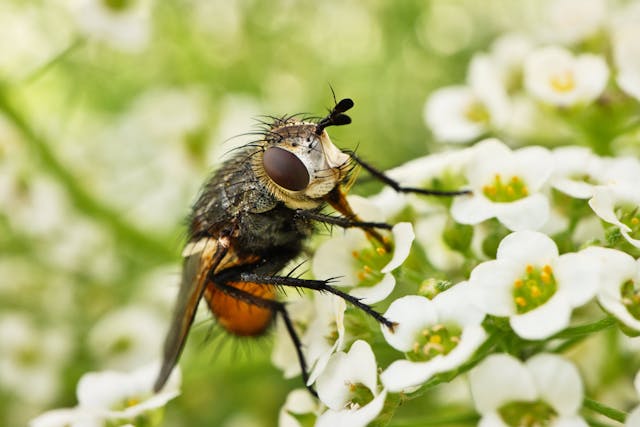Fear of Buzzing Insects: Understanding and Overcoming Entomophobia
The fear of buzzing insects is a common and often distressing experience for many people. Scientifically known as entomophobia, this fear can range from mild discomfort to severe panic. Buzzing insects, such as bees, wasps, and flies, are not only a nuisance but also trigger anxiety due to their unpredictable movements and potential to sting. For some, this fear can escalate to the point where it affects daily activities and outdoor enjoyment.
In this in-depth guide, we will explore the causes, symptoms, and strategies for managing the fear of buzzing insects. Whether you’re looking to understand your fear or seeking ways to overcome it, this comprehensive article will provide all the insights you need.
What is the Fear of Buzzing Insects?
The fear of buzzing insects, or entomophobia, is an intense, irrational fear of insects, specifically those that make buzzing sounds. This fear often stems from a combination of psychological, cultural, and evolutionary factors. For many, the sound of buzzing triggers a fight-or-flight response, as the brain associates it with potential danger, such as stings or bites.
Causes of the Fear of Buzzing Insects
Understanding the root causes of the fear of buzzing insects is crucial for addressing and managing it effectively.
Evolutionary Instincts
Humans are hardwired to avoid certain sounds and movements that signal danger. The buzzing of insects is often associated with threats like stings or diseases, which may explain why this fear is so prevalent.Personal Experiences
A past encounter with a buzzing insect, such as a bee sting, can leave a lasting impression and contribute to the development of this fear.Cultural Influences
Media portrayals and societal attitudes can amplify fears. For example, movies that depict swarms of bees or wasps as dangerous can reinforce negative perceptions.General Anxiety
People with existing anxiety disorders may be more prone to developing a fear of buzzing insects, as the sound can act as a trigger for heightened nervousness.
Symptoms of the Fear of Buzzing Insects
The symptoms of the fear of buzzing insects can vary depending on the severity of the phobia. Common symptoms include:
- Increased heart rate and sweating when hearing buzzing sounds.
- Avoidance of outdoor activities where buzzing insects are common.
- Difficulty focusing or relaxing in environments with insects.
- Physical symptoms such as nausea, dizziness, or shortness of breath.
How to Overcome the Fear of Buzzing Insects
While the fear of buzzing insects can feel overwhelming, there are several effective strategies to manage and overcome it.
1. Gradual Exposure Therapy
Exposure therapy is one of the most effective methods for overcoming fears. Start by looking at pictures of buzzing insects, then progress to being in controlled environments where insects are present.
2. Cognitive Behavioral Therapy (CBT)
CBT helps individuals reframe their thoughts about buzzing insects, replacing irrational fears with rational understanding.
3. Mindfulness and Relaxation Techniques
Deep breathing, meditation, and other relaxation exercises can reduce the physical symptoms of anxiety triggered by buzzing insects.
4. Education and Awareness
Learning about the behavior of buzzing insects can demystify them and reduce fear. For instance, understanding that most bees and wasps are non-aggressive unless provoked can help alleviate anxiety.
5. Professional Help
For severe cases, consulting a psychologist or therapist specializing in phobias may be necessary.
Tips for Avoiding Buzzing Insects
While overcoming the fear of buzzing insects is the ultimate goal, it’s also helpful to take practical steps to minimize encounters.
- Wear Light-Colored Clothing: Insects are less attracted to neutral tones.
- Use Natural Repellents: Citronella, eucalyptus, and lavender oils can deter buzzing insects.
- Keep Food Covered: Sweet foods and drinks can attract bees and flies.
- Install Screens: Mesh screens on windows and doors can prevent insects from entering your home.
FAQ Section: Fear of Buzzing Insects
1. What causes the fear of buzzing insects?
The fear of buzzing insects is often rooted in evolutionary instincts, past negative experiences, and cultural influences.
2. How can I stop being scared of buzzing insects?
Gradual exposure therapy, cognitive behavioral therapy, and relaxation techniques can help reduce fear over time.
3. Are buzzing insects dangerous?
Most buzzing insects, like bees and flies, are harmless unless provoked. Understanding their behavior can help alleviate fear.
4. Can children develop a fear of buzzing insects?
Yes, children can develop this fear due to personal experiences or exposure to anxious behavior from adults.
5. Should I avoid areas with buzzing insects?
Avoidance can reinforce fear. Instead, focus on taking precautions and gradually exposing yourself to these situations.
Conclusion: Fear of Buzzing Insects
The fear of buzzing insects is a natural response for many people, but it doesn’t have to control your life. By understanding the root causes, symptoms, and effective management strategies, you can take steps to overcome this fear and reclaim your peace of mind. Whether through gradual exposure, therapy, or practical avoidance techniques, the journey to conquering your fear begins with awareness and a willingness to change.

Share this:
- Click to share on Facebook (Opens in new window) Facebook
- Click to share on X (Opens in new window) X
- Click to share on LinkedIn (Opens in new window) LinkedIn
- Click to share on Reddit (Opens in new window) Reddit
- Click to share on X (Opens in new window) X
- Click to share on Threads (Opens in new window) Threads
- Click to share on WhatsApp (Opens in new window) WhatsApp




